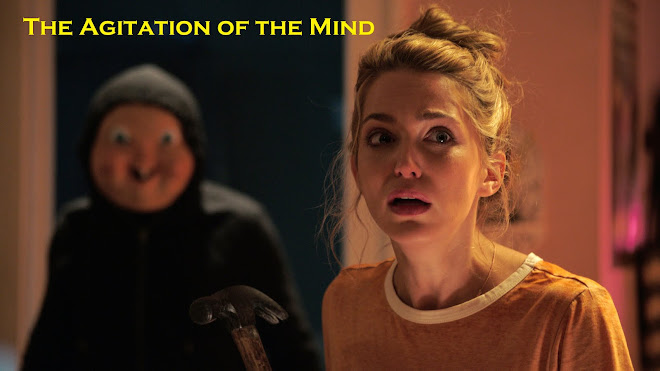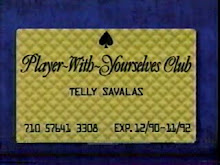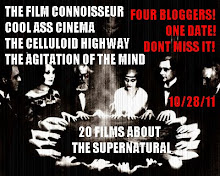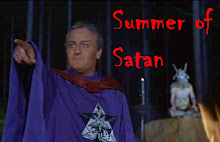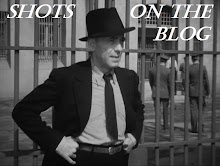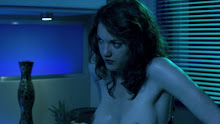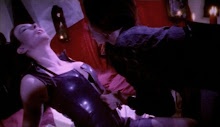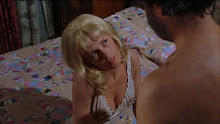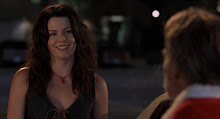Sunday, April 17, 2016
Eye in the Sky
A joint UK/US intelligence operation headed by Colonel Katherine Powell (Helen Mirren) is surveilling a safe house in Nairobi where high-ranking members of a terrorist cell – including radicalised nationals from both countries – are meeting. A remote control drone disguised as a bird provides insufficient coverage, so Kenyan agent and man-on-the-ground Jama Farah (Barkhad Abdi) is dispatched to get as close to the property as possible, where – under the noses of militia with short-tempers and itchy trigger-fingers – he deploys an even smaller drone, this one resembling an insect, and manoeuvres it into the house. Intel confirms the presence, in particular, of radicalised UK terror suspect Susan Danford (Lex King), whom Powell has been tracking for over half a decade. In Whitehall, Lieutenant General Frank Benson (Alan Rickman), Powell’s superior, talks Members of Parliament Brian Woodale (Jeremy Northam) and Angela Northman (Monica Dolan) and Attorney General George Matherson (Richard McCabe) through the operation in real-time. The intended outcome is the apprehension of Danford.
Then the perameters change. Footage of suicide bombers assembling explosive vests are transmitted from the house and Powell seeks Benson’s authorisation to use deadly force. Benson asks for ministerial approval. American drone pilot Steve Watts (Aaron Paul) and observer Carrie Gershon (Phoebe Fox) stand-by to deploy a missile from their aptly-named Reaper drone. When Gershon notices a young girl, Alia (Aisha Takow), selling bread at a stall close to the safe house, Watts questions Powell’s now-approved executive order. What follows is a succession of political wrangling as everyone from Woodale to the Foreign Secretary (Iain Glen) try to disengage themselves from involvement and/or responsibility. Meanwhile, US politicos – including White House advisor Jillian Goldman (Laila Roberts) and the Secretary of State (Michael O’Keefe) – advocate an expedient pro-bombing outcome.
The poster for ‘Eye in the Sky’ trumpets an appreciative quote from The Times: “a tense, morally complex and extremely prescient thriller”. Tense, yes – Gavin Hood’s direction is unobtrusive and economical, establishing four or five key locations and a hierarchy of tense interrelationships, and never losing sight of any single character’s part in the unfolding drama. Prescient, yes – this is the kind of stuff that earns that hoary old “ripped from the headlines” epithet (albeit from the headlines of The Daily Mail: everyone in the safehouse, regardless of nationality, is a terrorist because of religion; Danford’s backstory is basically “she became radicalised after hanging around mosques”. ‘Eye in the Sky’ is horribly racist and Islamphobic.)
But morally complex? Don’t make me fucking laugh. The script presents those inside the safe house as an immediate and credible threat and throws in a specious line about an inability to engage them on the ground; therefore the drone strike is a foregone conclusion. People are shown passing by or standing guard outside the safe house throughout the film; they will almost certainly be killed or badly injured – but this, too, is a foregone conclusion and the script (by Guy Hibbert) clearly doesn’t care about them. The morality of the act itself is never debated – drones find bad people so they can be killed and this is a good thing is the intellectual starting point from which the film proceeds – and what we’re left with is a bit of theorising on acceptable levels of collateral damage and how the death or serious injury of a child might be used by either side in terms of PR/propaganda.
Scenes of parliamentary pass-the-parcel play out like an episode of ‘Yes, Minister’ without the jokes, while the will-Alia-sell-all-the-bread? moments come off like a badly done Hitchcock homage; they serve to weaken any serious considerations the film might have traded in. Ditto the obvious attempts at humour, such as Benson’s fish-out-of-water mission to buy a present for his daughter or the Foreign Secretary taking urgent calls while entrenched on the toilet with food poisoning – perhaps these scenes were intended as a counterbalance to all the serious business, but they just come off as risible.
Sad to note, too, that the performances are generally lacklustre. Rickman’s is phoned in and it’s a genuine tragedy that ‘Eye in the Sky’ is his swansong. Dolan seems to think she’s still in character from ‘Alan Partridge: Alpha Papa’. Glen seems like he popped in between takes on ‘Game of Thrones’ and had his mind on other things. Mirren is good, but somewhat long in the tooth to be a serving member of the armed forces. Paul and Fox play well off each other, small glances between them communicating a world of doubt while they still function within the chain of command. Abdi does the best work of the ensemble, in no small part due to the fact that his is the only character who actually has an emotional investment, by dint of proximity, in Alia’s fate. Had the film played out entirely from his perspective in the danger zone, rather than on wall mounted screens and laptops viewed by overpaid right-wingers in the safety of their offices, it could have been the ‘All Quiet on the Western Front’ of the post-9/11 age. As it is, it’s a sixth form debate wrapped around a shiny, phallic bit of drone porn.
Labels:
Aaron Paul,
Alan Rickman,
Barkhad Abdi,
Gavin Hood,
Helen Mirren,
Iain Glen
Thursday, April 14, 2016
Midnight Special
All ‘Midnight Special’ had to do to earn itself a pass from The Agitation of the Mind was simply be good. That might sound like a fatuous statement, but believe me ‘Midnight Special’ could easily have been a disaster. Given the current climate of mainstream American cinema, it would have been all too easy for ‘Midnight Special’ to be terrible. Consider this synopsis: a young boy exhibiting otherworldly powers is hunted by the government (who want to weaponise him) and a religious cult (who see him as a shortcut to the rapture); his estranged parents and a small coterie of sympathisers set out on a desperate odyssey to protect him. Now consider the material in the hands of Michael Bay: flashy effects work and soulless violence. Or Neill Blomkamp: grimy effects work and nihilistic violence. Or J.J. Abrams: lens-flare-saturated effects work and sub-Spielberg mawkishness.
Fortunately, ‘Midnight Special’ was written and directed by Jeff Nichols, the man behind 2012’s sublime rites-of-passage genre ‘Mud’, and he brings to the table every plus point of that film: the confidence to foreground character and allow a slow-burn atmosphere to develop in its own good time; an acute sense of place and the ability to demonstrate in visual terms how character and location interact; a nuanced understanding of the fragility of innocence and the terrible things that lurk behind the wonders of an unexplored environment; the complex dynamics of familial relationships; a heartfelt empathy with outsiders; and a facility, as director, to elicit pitch-perfect performances, particularly from younger cast members.
Subject of which, step forward Jaeden Lieberher as Alton Meyer, the young lad at the heart of the story. He gives a performance far beyond his years, utterly convincing through every stage of Alton’s character arc. I could say more, but I want to keep this review devoid of spoilers. ‘Midnight Special’ hasn’t been heavily trailered or advertised and in one respect this is a good thing as it lets the audience discover the film on its own terms, but in another is unfortunate as it will, in all likelihood, come and go from multiplex screens within only a week or two, a small but brilliant film unceremoniously cleared out to free up as many screens as possible for ‘Captain America: Civil War’. Which is why I urge anyone reading these pages to catch ‘Midnight Special’ immediately. Don’t let the opportunity to see it on the big screen slip through your fingers. I am convinced that this film is destined for cult classic – if not outright modern classic – status.
Nichols’ script fleet-footedly dodges every possible cliché or hint of melodrama; what could have been an unholy conflation of ‘Firestarter’, ‘Super 8’ and ‘Red State’ emerges as an uncompromised artistic statement. The narrative begins in media res; a steady accretion of detail fills in backstory, interrelationships and the full context of what’s at stake. Nichols structures much of the first half as a road movie/on-the-run thriller. But without ever sacrificing the finer nuances of his story for the sake of obvious thrilleramics. Which isn’t to say he can’t stage a shockingly sudden shoot-out or a gripping car chase when the moment requires it. Another analogue with ‘Mud’: that film’s final act where the ‘Stand By Me’-style poignancy yields to a scene of joltingly edited bit of gunplay that gets its Peckinpah funk on.
The twin antagonists of ‘Midnight Special’ – state and religion – are obvious targets, but Nichols refuses to trivialise them or score cheap points. The religious cult are treated as stoic types who are convinced they are right, but function as a community in their own right. They aren’t slavering fanatics, demented extremists or lascivious hypocrites; even when they stage their last gasp attempt at kidnapping Alton, force is used sparingly and human doubts are all to evident behind their desperate actions. Likewise, the government/military types emerge as people doing a job instead of jargon-grunting hard-asses.
Every aspect of ‘Midnight Special’ – right up to its gorgeously realised final reel flight of fantasy (a phrase I use as recommendation not pejorative) – is grounded in reality. Its vision of Americana comprises motels, gas stations, small towns and vast swathes of open country. The openness of its road movie elements is in constant counterpoint to the intimacy of its character dynamics and the tense inevitability of what its main characters are fleeing from.
Visually, the film is precise, focused and incredibly well thought-out (its palette of nocturnal landscapes and low-lit interiors gradually cedes – in a way that’s inextricably bound up with the narrative – to the ethereal glow of the magic hour and finally the stark absolute of daylight. Adam Stone’s cinematography is something I want to write a love-letter to. Ditto David Wingo’s score. Acting-wise, I’ve already hailed Lieberher; Michael Shannon, Joel Edgerton, Sam Shepherd and Adam Driver – all damn good actors – deliver effectively restrained performances. Kirsten Dunst is as good as I’ve ever seen her: a late-in-the-game scenes requires her to go from buttoned-down pragmatism to awestruck; and with one piercing look that combines woundedness, stupefaction and something of the transcendental, she pulls off a moment of cinematic alchemy.
In fact, you can apply that description to Nichols as regards his achievement with the film entire. ‘Midnight Special’ is a riveting, enigmatic, thought-provoking and ultimately beautiful work of cinema. It may well be the best American film of the year.
Monday, April 11, 2016
Batman vs Superman: Dawn of Justice
‘Batman vs Superman: Dawn of Justice’ is no classic. Let’s be completely honest about that. It’s as flawed as ‘Man of Steel’ was. Some of it works and some of it doesn’t. The things that don’t work – in particular matters pertaining to Lex Luthor – are hugely awful. The things that do work – in particular matters pertaining to Diana Prince – are as iconic as any fanboy could wish for. The film is a mishmash, and narratively wonky. But does it deserve the outpouring of hatred that the critics have almost unanimously delivered? In my humble opinion, no.
Which isn’t to say that, having emerged from the cinema with a general feeling of I enjoyed that more than I thought I would, I’m going to fashion this review into not just an apologia for ‘B vs S’, but reappraise it as a misunderstood classic of the genre. No, sir. It would be remiss of any reviewer to gloss over the film’s problems, just as it’s lazy of the majority of them to join in the hurling of brickbats.
In the interests of objectivity and balance, let’s acknowledge the faults. First and foremost, the characterisation of Lex Luthor is terrible, partly because Jesse Eisenberg is miscast but mostly because the script (a) gives him some of the most thankless dialogue any actor could find himself saddled with, and – more problematically – (b) fails in establishing any credible motivation for his increasing sociopathic behaviour. And, no, his oft-repeated variations on a theme of man’s victory over God doesn’t really cut it since there’s no moment in his character arc that leads him to this mindset. In fact, he doesn’t even have a character arc. It’s as if the first script conference settled on Lex Luthor as villain based on the rationale that everyone knows he’s the villain anyway so let’s just wheel him onstage and give him villainous things to do and we won’t need to bother with any of that tedious exposition business.
Likewise, the titular Batman/Superman conflict is predicated on very little. Sure, there’s the effective opening sequence where the finale of ‘Man of Steel’ is restaged from Bruce Wayne (Ben Affleck)’s perspective as he navigates rubble-strewn and dust-choked streets in an attempt to facilitate his employees’ evacuation while Superman (Henry Cavill) and General Zod twat each other in an orgy of city-wide destruction and wait a fucking minute, since when exactly was Wayne Industries based in Metropolis? So, yeah, the ultimate superhero anti-hero, a man who was wreaked his fair share of havoc in order to take down bad guys, suddenly goes all antagonistic on Superman because he wreaked havoc in order to take down a bad guy.
Meanwhile, Clark Kent pursues a media campaign against Batman for little other reason that it gets him off the sports desk. Though why he spends his time at the office getting all moody and embittered when he’s shacked up with the uber-foxy Lois Lane (Amy Adams) is anybody’s guess. Ditto why Lois continually puts her life in danger chasing down stories when she’s just as loved-up herself.
Finally: the flashbacks/dream sequences. They’re piss-poor, on both a conceptual and aesthetic level. Really, really piss-poor.
And if you took ‘B vs S’ on the 500 words above, the critical kicking would be easy to understand; in fact, you’d probably feel like grabbing a burning touch and allaying yourself with the village lynch-mob. But said course of behaviour would leave one blind to the pleasures of the film. To whit:
Ben Affleck as Batman. I’ll cop a guilty plea, right here and right now, to face-palming and groaning when I heard the news of Affleck’s casting. And by the same chalk I’ll hold my hands up and admit that I was wrong. Trudging through the metaphorical treacle of a script that can’t even establish a fundamentally plausible motivation for his character, Affleck nonetheless knocks it out of the park in his portrayal of a Batman who is middle-aged, world-weary and descending into an embittered psychosis. This is a not just a Batman who, prior to the titular stand-off, has to force himself through a masochistic training regime and build an armoured suit that it’s effortful even to walk in (in fact, there’s something about seeing the un-suited-up Bruce Wayne pounding at a truck tyre with a sledgehammer that presents an anti-iconography: the training montage actually strips a superhero down to a new personal low), but Affleck is just as acute in his characterisation of Bruce Wayne, showing a jaded multi-millionaire going through the motions of what society expects of him; even the playboy lifestyle and womanising seems forced, to the point where Alfred sneers at him that there’s little hope for a next generation.
Subject of whom: Jeremy motherfuckin’ Irons. Hot on the heels of his fantastic turn in ‘High-Rise’, he reinvents Alfred to his own specifications within seconds of appearing onscreen. Retaining the Jeeves-like pragmatism of the character’s previous incarnations, Irons adds a level of barbed irascibility and the result is magnificent. In fact, I’d give Irons the Agitation of the Mind “man of the match” award if it weren’t for …
… Gal Gadot as Diana Prince/Wonder Woman. Introduced in oblique fashion, with much of her narrative arc and motivation remaining enigmatic for most of the running time, Gadot isn’t given much to do but look slinky and seductive as Prince and wield a sword in menacing fashion as Wonder Woman. Given the script’s total inability to treat a female character as anything other than a plot device, Gadot could easily have come adrift in the melee, her character mere eye-candy in the CGI-driven morass of the final act. But, by God, a former model who I wouldn’t have previously credited as having any claim to cinematic iconography doesn’t just make something out of nothing, she creates bona fide moments of mainstream cool.
Other plus points: Snyder’s commitment to a dark vision of the material – slammed by the critics for humourlessness – yields some genuinely striking moments: the film begins and ends with funerals (Snyder shoots funerals with the same quasi-pornographic delight that Argento at his best reserved for death scenes); Wayne’s contact with a Russian mobster takes place at a grungily ugly bare-knuckle boxing competition; Superman’s coercion into appearing at a congressional hearing is the culmination of a subplot about political showboating/careerism and is full-stopped by a hugely cynical punchline almost calculated to plug into contemporary America’s terrorism fear-factor. Snyder plays it equally dark and cynical in terms of classical allusions, throwing in Icarus, Parsifal and a painting in Luthor’s apartment that’s basically a combination of Gustav Dore and William Blake; there’s even a dream/hallucination sequence where Kevin Costner reappears as Clark Kent’s mortal step-father, staged in such a manner that short of inserting a title card reading “and my father on that sad height” the nod to Dylan Thomas couldn’t be more explicit.
And this is perhaps what ‘B vs S’ offers as an apologia for itself even in the face of its harshest critics. In an era where superhero movies – specifically those of the Marvel ilk – have come to define mainstream cinemagoing, Iron Man and Captain America might flirt around the edges of prescient storylines about the corrupting influence of power and the fear of the unknown, but you’re highly unlikely to stumble across a classical allusion or a debate on the very redundancy of heroism; whereas Snyder, carrying on the dialogue he established in ‘Man of Steel’, batters furiously and incessantly away at the very concept of the genre even as he embraces its most fetishistic excesses.
Labels:
Amy Adams,
Ben Affleck,
Gal Gadot,
Henry Cavill,
Jesse Eisenberg,
Zack Snyder
Monday, April 04, 2016
Man of Steel
Right then, I’ve steeled myself up (pardon the pun) and I’m going to see ‘Batman vs. Superman: Dawn of Justice’ on the big screen later this week. There’s a certain car-crash mentality to this decision. I can’t even call it morbid curiosity, because curiosity suggests an open-mindedness, a spirit of inquiry rather a morbid confirmation of what one knew already. Yes, I know ‘BvS: DoJ’ is going to be downright flawed at best and an abject piece of shit at worst. But after a fortnight of reading reviews brimming with bilious hatred, I need to see it for myself. If only to experience the zeitgeist. The last time the collective critical consensus went against a major tentpole release – Gore Verbinski’s ‘The Lone Ranger’ – I opted out of seeing it theatrically. Two years later, I caught in on DVD and my immediate opinion was “yeah, whatever, not great, not terrible, nice train chase”; then, with a jolt of realisation and complete bewilderment, “wait a minute, the critics hated on it that much?”
So I’m going to tootle along to my local multiplex, lay my money down, invest two and a half hours of my life (three if you count the wanky ads for piss-weak foreign lager and aspirational lifestyle bollocks), and revel in the mangled wreckage and streaks of blood on the side of the highway. We’re talking schadefreude, folks, and you don’t need to speak German to dig it. Because tonight, thank God, it’s Zack Snyder and not me.
But before I go and see ‘BvS: DoJ’ and before I hammer out my review of it in a Lagavulin induced haze, there is the necessary context of ‘Man of Steel’. So here goes.
Cards on the table: I liked Richard Donner’s ‘Superman’ with Christopher Reeve. The sequels were shabby, and got worse as the franchise lumbered on. Bryan Singer’s ‘Superman Returns’ was one of the dullest big-budget studio films I’ve ever seen, and I’m including the ‘Pirates of the Caribbean’ sequels in that, so nyah-nyah-naa-nyah-nyah. Innit?
Cards on the table part two: I’m not that keen on Zack Snyder. His ‘Dawn of the Dead’ remake was better than it had any right to be, but nothing else in his filmography has lived up to its promise. ‘Sucker Punch’ came closest, and at least had the feel of a work by an auteur, but I still came away from it with a feeling of “meh”.
So I didn’t have much hope for ‘Man of Steel’. And maybe that negative expectation worked in its favour when I finally got round to seeing it. There was the opening sequence with Russell Crowe as Superman’s dad and a nerdishly unholy dose of sci-fi porn – glitzy, borderline incoherent and thunderously unsubtle … but it did the job. There was the montage of Superman-in-waiting, from his childhood as stepson to a couple of all-American farmers (Kevin Costner and Diane Lane), to his troubled, peripatetic twenties – a welter of swaying cornfields, tornadoes, schoolkids in peril and oil rig fires … bludgeoningly obvious stuff, but all in context and effective enough. And. Then. Snyder. Went. Fucking. Apeshit.
No stand-in for tarnished post-Nixon patriotism à la Donner’s classic; no heavy-handed Christ parable à la Singer’s snore-fest (although Snyder sneaks the odd visual metaphor for crucifixion). Nope: what we have in ‘Man of Steel’ is a superhero for a jaded, paranoid and politically compromised age where the entertainment value of superheroes is in stark contrast to the swathes of destruction they’d cause if you rooted them in an even remotely realistic scenario. This is the single greatest achievement of ‘Man of Steel’ and Snyder was given a kicking for it.
Hold that thought while we consider a heavily adumbrated précis of the film’s narrative: the infant Kal-El escapes Krypton in the midst of a putsch orchestrated by General Zod (Michael Shannon); he struggles to be accepted on Earth; the moment he discovers his lineage and truly embraces his powers as a force for good, Zod turns up looking for him and the US military first arrest and then cravenly hand him over to Zod in an attempt to avoid an intergalactic ass-whupping. When it becomes obvious that Zod is going to royally fuck over the planet and use its ruins as the basis of a new Krypton, Superman (Henry Cavill) saves mankind anyway because … well, actually, this is where the film loses me. Maybe because his step-parents were nice. Maybe because he quite fancies investigative reporter Lois Lane (Amy Adams). Maybe because he just wants to prove everyone wrong.
Got that? America – and by extension the world – doesn’t give a flying one about Superman. Scenes of a handcuffed Superman and a heavily armed US force handing him over to Zod constitute the bitterest comment on extraordinary rendition that I’ve seen in any mainstream American film, let alone a superhero flick. Snyder ramps up the deconstructive cynicism with Superman’s climactic smackdown with Zod and his forces. Whereas Marvel have given us epic city-wide battles, portals between worlds and all manner of futuristic technology with barely a civilian casualty, ‘Man of Steel’ stages its almost interminably wearying slugfest in a recognisable environment where a downtrodden populace are going through the motions of working, travelling and making ends meet. The carnage that ensues, excessive and CGI-driven though it is, takes on a weight and a brutish aftermath that the Marvel films gloss over. Whether it was intended or not, Snyder and his creative team seem to be holding up a mirror to the audience’s demands for violence and destruction and asking them to judge their own slavering reflections. Michael Powell pulled this stunt with ‘Peeping Tom’ back in 1959 and it all but ended his career. Snyder isn’t exactly standing in line at the labour exchange right now, but he certainly caught hell for it.
‘Man of Steel’ is a flawed but interesting film. Big concepts bubble beneath its surface, but are subjugated in favour of iconography – grim and bloody iconography but iconography nonetheless. Potentially fascinating characters are given glimpses of an interesting narrative arc then unapologetically sidelined, with Adams and Laurence Fishburne (as Lois’s hard-ass editor) coming off the worst in this respect). And it’s all so grungily self-important. But it strives to locate the concept of the superhero in a world that’s so morally, politically and socially compromised that even the offer of unconditional heroism is met with cowardice, fear and an executive order as regards the use of weapons – and the conclusion it arrives at is dark. The original big-screen iteration of Superman was the hero America needed at the time; the one in ‘Man of Steel’ ends up as compromised as the society he protects.
Subscribe to:
Posts (Atom)
